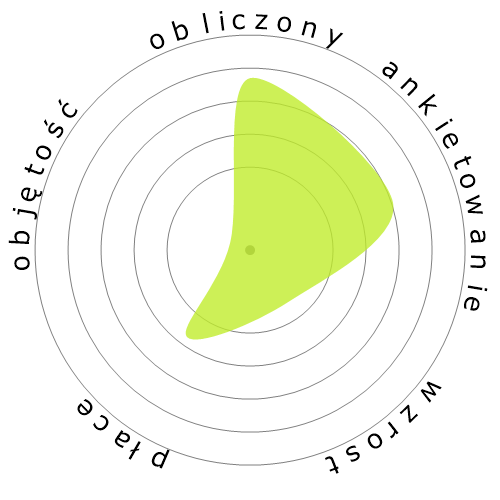Dyrektorzy muzyczni i kompozytorzy




Ludzie również oglądali
Obliczone ryzyko automatyzacji
Niskie ryzyko (21-40%): Zawody na tym poziomie mają ograniczone ryzyko automatyzacji, ponieważ wymagają połączenia umiejętności technicznych i skoncentrowanych na człowieku.
Więcej informacji na temat tego, czym jest ten wynik i jak jest obliczany, jest dostępne tutaj.
Ankieta użytkownika
Nasi goście zagłosowali, że jest małe prawdopodobieństwo, iż ten zawód zostanie zautomatyzowany. To ocena jest dodatkowo wspierana przez obliczony poziom ryzyka automatyzacji, który szacuje 21% szansę na automatyzację.
Jakie są Twoje zdanie na temat ryzyka automatyzacji?
Jakie jest prawdopodobieństwo, że Dyrektorzy muzyczni i kompozytorzy zostanie zastąpione przez roboty lub sztuczną inteligencję w ciągu najbliższych 20 lat?
Nastroje
Poniższy wykres jest zamieszczany wszędzie tam, gdzie istnieje znaczna liczba głosów, aby przedstawić istotne dane. Te wizualne reprezentacje pokazują wyniki ankiet użytkowników w czasie, dostarczając istotnych wskazówek dotyczących trendów nastrojów.
Nastroje w czasie (rocznie)
Wzrost
Liczba ofert pracy na stanowisku 'Music Directors and Composers' ma wzrosnąć 2,7% do 2033
Całkowite zatrudnienie oraz szacowane oferty pracy
Zaktualizowane prognozy mają być dostępne 09-2025.
Płace
W 2023, mediana rocznej pensji dla 'Music Directors and Composers' wynosiła 62 590 $, czyli 30 $ za godzinę.
'Music Directors and Composers' otrzymali wynagrodzenie wyższe o 30,2% od średniej krajowej, która wynosiła 48 060 $
Płace z biegiem czasu
Objętość
Od 2023 roku zatrudnionych było 10 770 osób na stanowisku 'Music Directors and Composers' w Stanach Zjednoczonych.
To oznacza około < 0,001% zatrudnionej siły roboczej w całym kraju.
Inaczej mówiąc, około 1 na 14 tysiąc osób jest zatrudnionych jako 'Music Directors and Composers'.
Opis stanowiska pracy
Prowadź, kieruj, planuj i przewodź wykonaniami instrumentalnymi lub wokalnymi artystów muzycznych lub grup, takich jak orkiestry, zespoły, chóry i kluby śpiewu; lub twórz oryginalne utwory muzyczne.
SOC Code: 27-2041.00


Komentarze
Leave a comment
This is without taking into account all of the interpersonal elements of composition, which are also not well understood by people who don't do this work.
Finally, given that humans are subject to copyright law and that the level of imitation and inspiration from previous works is controlled and limited by these laws, it is unlikely that music created by AI that was not drastically reshaped by a human composer would avoid copyright lawsuits or be subject to copyright itself, as current technology in this field only knows how to aggregate and make stylistic choices based on probability. A human composer is not going to waste time fiddling with AI compositions to "get them there" when they could just write something themselves.
Show me an evangelist who actually produces music and isn't heavily invested in AI themselves in some way, and I'll reconsider.
bye bye dutse, hesh and koot
1. Which is understanding which part of what they created did a human like and thus may have trouble using reinforced learning.
2. Lyrics have meaning behind the words. Its much more complex than just a melody. Its these lyrics and building melody in combination with lyrics which is going to be rather difficult but not impossible. Lyric writing is going to be one of the Last things AI will be able to do.
https://www.youtube.com/watch?v=wYb3Wimn01s
Zostaw odpowiedź na temat tego zawodu